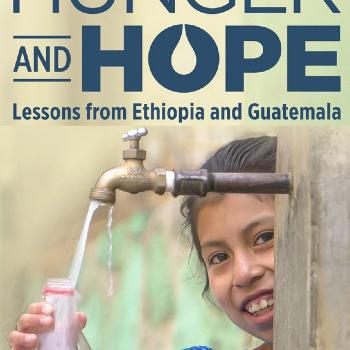Now Featured at the Patheos Book Club
Saving Sex
Sexuality and Salvation in American Evangelicalism
By Amy DeRogatis
Discussion Questions/Reading Guide
- Looking at the cover of this book, what did you think this book would be about? Did you feel any apprehension about discussing this book? Can you identify one worry you have about discussing this book?
- What do you think the title means?
- The author argues that evangelicals are not anti-sex. Why does she make that argument? What evidence does she provide to support her argument? Are you convinced?
- When it comes to sex, are evangelicals resisting secular culture, responding to secular culture, or transforming secular culture? What does the author think? What do you think?
- Writers who support the purity movement argue that they are empowering young women to be brave and counter-cultural in a culture that sexually degrades women. Are there any aspects of their argument that make sense to you? Can you find a specific positive example of young women being empowered? Are there any aspects of the purity movement that seem disempowering to young women? Does the author betray her own opinion about the purity movement?
- How are purity balls similar or different from Daddy/Daughter dances? Did the discussion of purity balls cause you to think about how these "secular" community-organized dances promote fairytale narratives and heterosexual marriage?
- How are evangelical sex manuals different from secular sex manuals? Why do evangelical writers say that they have the best sex? What happens when evangelicals do not experience great sex? What surprised you the most when reading this chapter?
- What are sexually transmitted demons and how do they relate to sexually transmitted diseases? How should we understand sexually transmitted demons in a world of scientific rationality, medicine, and genetics?
- How is spiritual warfare played out on the sexual body? Why does the sexual body remain an entry point for demonic forces? Has this always been a relationship between sexuality and evil in the history of Christianity, or is this something new?
- The author makes the case that deliverance from sexual demons is not as countercultural as it might at first seem. What does she mean by that? Do you buy her argument?
- What is pro-natalism? Is it simply a Protestant form of Natural Family Planning?
- Why do some evangelicals resist all forms of contraception? How is rejecting contraception related to their views of secular culture and other evangelicals?
- What is biblical womanhood? Some proponents of this movement argue that women have been duped by the false promises of feminism. Do you agree with their position? What are the false promises? What do you think of the contention that motherhood and homemaking is denigrated in secular society?
- Pro-natalists argue that there are cultural myths that have fooled women into using contraception. What are these myths? What, according to these writers, are the physical and spiritual risks of contraception?
- How are writings on sexuality by African American evangelicals similar or different to the overwhelming majority of white evangelical authors? Although white evangelicals purport to write to a general audience the author states that there are reasons to believe they are imagining a white readership. What are these reasons?
- The author refers to writings by T. D. Jakes and a testimony by Prophetess Juanita Bynum. What does she argue is unique about their discussion of born-again Christians and sexuality? Do you think there is a need for niche marketing when it comes to evangelical sex? Is this a reflection of racial tension, marketing strategies, or both?
- In the Epilogue, the author adopts a slightly different tone from the rest of the book. Do you learn what is at stake for the author in the Epilogue?
- What did you think about this statement: "Those who do not fit the biblical model are seen as marginal . . . and can be explained away as 'exceptions.' They are portrayed as outliers in the wide circle of the blessed. They are not, however, outside the boundaries of being used as examples to affirm the author's own purity and courage to speak out against secular culture" (153-4)?
- What did you learn that you didn't know about evangelicals and sexuality from reading Saving Sex? Are there other topics you wish the author had explored? Overall, do you think that author was fair in her portrayal of evangelical sex writings? If you were going to write a book on evangelicals and sexuality what would you include?
- If you could ask the author one question, what would that be?
9/30/2014 4:00:00 AM



